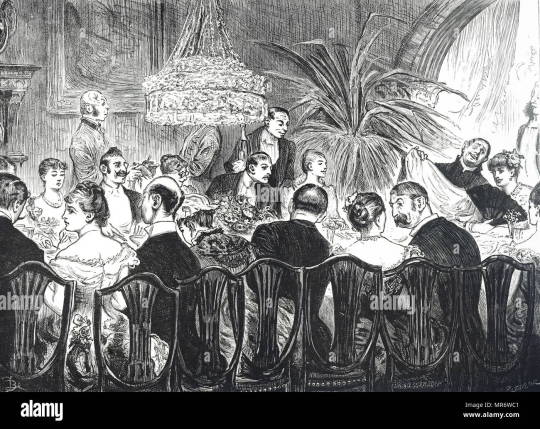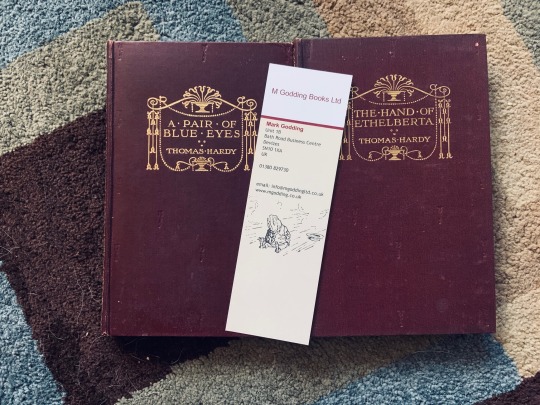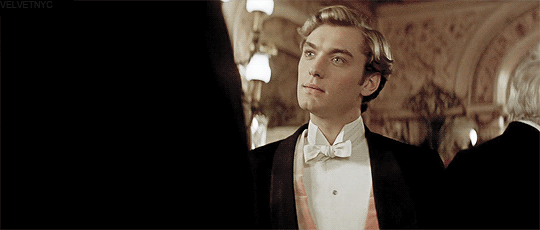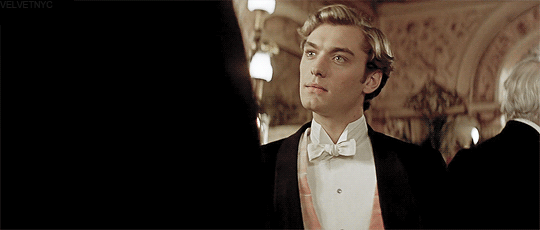#the hand of ethelberta
Quote
She has too much poetry in her.
Thomas Hardy, The Hand of Ethelberta (1876)
#just dropped a pretty penny on a 1914 standalone edition of 'the romantic adventures of a milkmaid'#i do not fuck around when it comes to my man#thomas hardy#the hand of ethelberta#literature
2K notes
·
View notes
Text

thomas hardy ily
2 notes
·
View notes
Text

Book 5: The Hand of Ethelberta
Title: The Hand of Ethelberta
Author: Thomas Hardy
Dates: 1/13/24 - 1/15/24
Medium: Google books free scan that I read on my Kindle
Rating: ⭐️⭐️⭐️.5/5
Quote: “Let me be. Life is a battle, they say; but it is only so in the sense that a game of chess is a battle—there is no seriousness in it; it may be put an end to at any inconvenient moment by owning yourself beaten, with a careless “Ha-ha!” and sweeping your pieces into the box. Experimentally, I care to succeed in society; but at the bottom of my heart, I don’t care.”
Thoughts:
This book was selected by asking my boyfriend for a year and choosing a book in the 1001 book that was written that year. I just so happened to stumble upon Mr. Hardy’s lesser known comedy. And since it was free on Google, I picked up right away. If you are going to read this version be warned that some pages are out of order or scanned weird.
I found this book funny. Mr. Hardy uses situational juxtapositions to create humor and ridicule society’s rules. It was similar to Emma in that sense. I couldn’t put this book down; Each twist and situation that Mr. Hardy elegantly created were riveting. His writing was fantastic and I look forward to picking up another one of his books. I also want all the 1800s readers in my life to pick up this book so I can complain about the ending to them (I took off a whole star from the rating for it).
A grand theme of this book was that Ethelberta always gets what she wants. The ending really hammers this home, as I found the situation she ends up in almost unbearable. The last 100 pages had me yelling and sighing as it became clear what she had gotten herself into. The chase and Picotee’s resolution simply remind us that what Ethelberta says, goes.
#Lady’s 1001#The Hand of Ethelberta#thomas hardy#book review#spoilers#opinion#Tried to find a photo without a watermark but oh well
0 notes
Text

Thomas Hardy, from “The Hand of Ethelberta” wr. c. 1876
2K notes
·
View notes
Text

[06.27.2020] So excited to receive these books to add to my Thomas Hardy collection 📚💕‼️
#thomas hardy#thomas hardy books#a pair of blue eyes#the hand of ethelberta#godzilla reads#book collection#book hoarder#book addict#book collector#book blogger#book blurb#book buying#library#personal library#books and reading#books and literature#books and libraries#antique book#old book#bookmark#antique bookshop#books#bookblogging#bookblr#reading#bookworm#booklover#bookish#bibliophile#book aesthetic
8 notes
·
View notes
Photo

Strong Female Characters in 19th-Century Fiction
Some look back on the 1800s as a time of rampant sexism, patriarchy, male dominance, gender inequality — whatever you want to call it. And it was indeed that sort of time. But a number of 19th-century female novelists, and a few male ones, managed to directly or indirect speak against that in some of their books.
I thought of this last week while reading Lelia by George Sand (born Amandine Lucile Aurore Dupin). In that fascinating 1833 novel, the independent, intellectual, skeptical, cynical, depressed, world-weary, God-doubting title character in some ways sounds like she could be living in 2018 — if the eloquent language used in Sand’s philosophical book were more casual and not densely rich like a lot of 19th-century prose was. Lelia is not always an easy book to read, but you’ll rarely see better writing than penned by Sand (whose image accompanies this blog post).
Anne Elliot of Jane Austen’s Persuasion (1818) is another strong heroine. The capable Anne is in love with Captain Frederick Wentworth, but lives a very useful life even as the relationship between her and Wentworth is thwarted for years.
The star of Charlotte Bronte’s Jane Eyre (1847) has strong feminist leanings that come out in various ways — including her pride in being smart, her need to work, and her insistence that she be an equal in marriage.
Helen in Anne Bronte’s The Tenant of Wildfell Hall (1848) courageously leaves her abusive/alcoholic husband to save both her son and her own self-worth. It’s a novel so feminist that Anne’s not-quite-as-feminist sister Charlotte unfortunately helped prevent wider distribution of it after Anne’s death.
Of course, many of the 19th century’s male critics and readers slammed works that dared depict women as equal to men. Undoubtedly one of the reasons fewer women back then tried to write novels — and a number of those who did write them used male or gender-neutral aliases.
Another author with a George pseudonym, George Eliot (born Mary Ann Evans), created a number of strong women — including lay preacher Dinah Morris of Adam Bede (1859). And Eliot lamented the second-class citizenry of female characters in novels such as The Mill on the Floss (1860), in which Maggie Tulliver’s less-brainy brother is treated much better than her by their parents and society as a whole.
Jo March, who thirsts to be a writer, is another nonstereotypical 19th-century female — in Louisa May Alcott’s 1869 novel Little Women.
And Kate Chopin’s The Awakening (1899) depicts Edna Pontellier’s memorable rebellion against her constricted role as a wife and mother.
Can 1900 be considered the last year of the 19th century? If so, Colette’s Claudine at School belongs in this discussion with its assertive, mischievous, hilarious protagonist.
Some male novelists of the 1800s also created female protagonists who didn’t act like stereotypical women of their time. Examples include Jeanie Deans in Sir Walter Scott’s The Heart of Midlothian (1818), Judith Hutter of James Fenimore Cooper’s The Deerslayer (1841), Becky Sharp of William Thackeray’s Vanity Fair (1847), Hester Prynne of Nathaniel Hawthorne’s The Scarlet Letter (1850), Marian Halcombe of Wilkie Collins’ The Woman in White (1859), the title character in Thomas Hardy’s The Hand of Ethelberta (1876), journalist Henrietta Stackpole in Henry James’ The Portrait of a Lady (1881), and the martyred protagonist in Mark Twain’s historical novel Personal Recollections of Joan of Arc (1896).
Of course, there were also strong women in pre-1800s novels, with just two examples being the very different stars of Daniel Defoe’s Moll Flanders (1722) and Frances Burney’s Evelina (1778). Moll has a tougher exterior than Evelina, but the latter protagonist also has lots of inner strength.
With grateful that to
Dave Astor at https://daveastoronliterature.com/2018/06/03/strong-female-characters-in-19th-century-fiction/Strong Female Characters in 19th-Century Fiction
8 notes
·
View notes
Link
New three-part dramatisation of Thomas Hardy's novel about beautiful, poor, young Dorset woman Tess Durbeyfield, told from Tess's point of view. In today's episode, Tess's father is convinced that the family's fortunes are about to improve.
Cast
TESS ..... Faye Marsay
ANGEL ..... Matthew Tennyson
ALEC ..... Robert Emms
ROSIE ..... Bettrys Jones
CAR D'ARCY ..... Alex Tregear
FELIX ..... Hasan Dixon
CUTHBERT ..... Chris Lew Kum Hoi
JOAN DURBEYFIELD ..... Maggie Service
JACK DURBEYFIELD ..... Roger Ringrose
ABRAHAM ..... Aaron Gelkoff
ELIZABETH/ LIZA LU ..... Ell Potter
ISAAC ..... Noah Leggott
LILY ..... Tayla Hutchinson
MRS D’URBERVILLE ..... Elizabeth Counsell
TOM ..... David Seddon
PARSON ..... Tony Turner
Author, Thomas Hardy
Dramatist, Katie Hims
Musical arrangement, Colin Guthrie
Hardy adviser, Professor Graham White
Director, Mary Peate
NOTES:
During 2021 on Radio 4, Hardy’s Women takes a fresh look at some of the novels of Thomas Hardy through the eyes of his female protagonists. Tess of the D’Urbervilles is the first dramatisation. Later titles include Jude the Obscure, The Woodlanders, The Hand of Ethelberta and Two on a Tower.
13 notes
·
View notes
Photo


Between himself and her there was that kind of division which is more insurmountable than enmity; for estrangements produced by good judgment will last when those of feeling break down in smiles. Not the lovers who part in passion, but the lovers who part in friendship, are those who most frequently part forever.
- Thomas Hardy , The Hand of Ethelberta
29 notes
·
View notes
Photo

Love Quote By Thomas Hardy, “New love is brightest, and long love is greatest; but revived love is the tenderest thing known upon earth.” Thomas Hardy, - The Hand Of Ethelberta
1 note
·
View note
Text
0 notes
Quote
New love is brightest, and long love is greatest; but revived love is the tenderest thing known upon earth.
Thomas Hardy, - The Hand Of Ethelberta
1 note
·
View note
Text
9 Men Quotes Of Thomas Hardy
9 Men Quotes Of Thomas Hardy
1.
“Fundamental belief consoled him for superficial irony.”
Thomas Hardy – The Mayor Of Casterbridge
2.
“A half knowledge of another’s life mostly does injustice to the life unknown.”
Thomas Hardy – The Hand Of Ethelberta
3.
“It is difficult for a woman to define her feelings in language which is chiefly made by men to express theirs.”
Thomas Hardy – Far From The Madding Crowd
4.
View On WordPress
0 notes